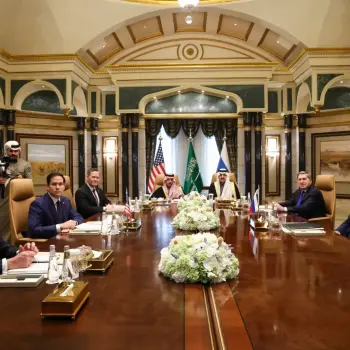The case of Chinese dissident Chen Guangcheng has many people thinking back to the personal, proactive approach of Ronald Reagan to the dissidents and religious believers repressed by the former Soviet Union. Reagan did not merely care deeply about the fate of the dissidents; he made repeated personal contact with his Soviet counterparts to negotiate their release.
The one-on-one negotiations worked. Author Kiron Skinner, a student of the Reagan years, relates that Reagan's direct intervention secured the release of two Pentecostal Christian families who took refuge in the U.S. embassy in Moscow from 1978 to 1983:
By the summer of 1983, at the height of the Cold War chill, Reagan and [Soviet premier Yuri] Andropov had privately worked out the details of the Pentecostals' release from the U.S. Embassy in Moscow and the families were allowed to leave the country. As Secretary [of State George] Schultz writes in his memoir, "This was the first successful negotiation with the Soviets in the Reagan administration." Schultz further notes, "Reagan's own role in it had been crucial." (Kiron Skinner, Turning Points in Ending the Cold War, pp. 103-4)
Reagan's negotiations also secured the release of well-known dissident Natan Sharansky in 1986. Skinner writes that most of Reagan's own foreign-policy staff was unaware of the extent of his direct approach for getting dissidents released.
In a larger sense, Reagan's approach to this problem was emblematic of his strategic approach to both domestic policy and the Cold War. Beyond his compassion for the oppressed, he believed that liberating people—to think their own thoughts, to seek the truth, to work, aspire, own, and give according to their individual personalities and talents—was a way of making the world safer and more peaceful. He did not fear, or propose merely to tolerate, the consequences of liberty. He actively pursued them and considered them qualitatively better than any other conditions. For him, they were more than an abstract, moralistic ideal with questionable value for the real world.
Ambassador Jack Matlock, Jr., who served in the Reagan administration and as the U.S. ambassador to the Soviet Union from 1987 to 1991, understood the genuine strategic importance Reagan placed on both personal liberty and liberality in the political order. Matlock shared and codified these views, as he recounts in his 1995 history of the fall of the Soviet Union:
The crux of the [U.S.-Soviet security] problem was that the Soviet Union would have to change before the U.S.-Soviet relationship could improve fundamentally. If the Soviet Union stayed as it was, we could hope only to manage the mutual hostility, not to harmonize policies . . .
I was convinced that open borders, the free flow of information, and the establishment of democratic institutions would produce a fundamental change in the Soviet system . . . (Autopsy on an Empire: The American Ambassador's Account of the Collapse of the Soviet Union, pp. 80-1)
Matlock explains that the Reagan administration saw human rights as closely interrelated with traditional security issues such as arms control and conflict resolution (pp. 84-5). Progress in getting the Soviet Union to liberalize its domestic political conditions was progress for American security. The government of a Soviet Union with a free flow of information, whose citizens could travel at will, would be forced by its own people to acknowledge the truth and behave in a more accountable manner. Such a government would be a more reliable partner for security agreements.
Reagan's concern for dissidents was also emblematic of a second aspect of his more general approach, which was his emphasis on direct contact with his counterparts, personal negotiation, and suasion. Reagan did not try to engineer policy systems that would induce the Soviets into desired forms of behavior, as if global security policy were a mechanism and the Soviets a secondary gear. Instead, he stated positive propositions—he clearly and unambiguously announced what he wanted to achieve—and put his energy into persuading the Soviets to agree with him. His approach was always to appeal individually to their moral sense, compunction, and intelligence, rather than to exploit—on the basis of abstract theory—their putative motives and anxieties.





